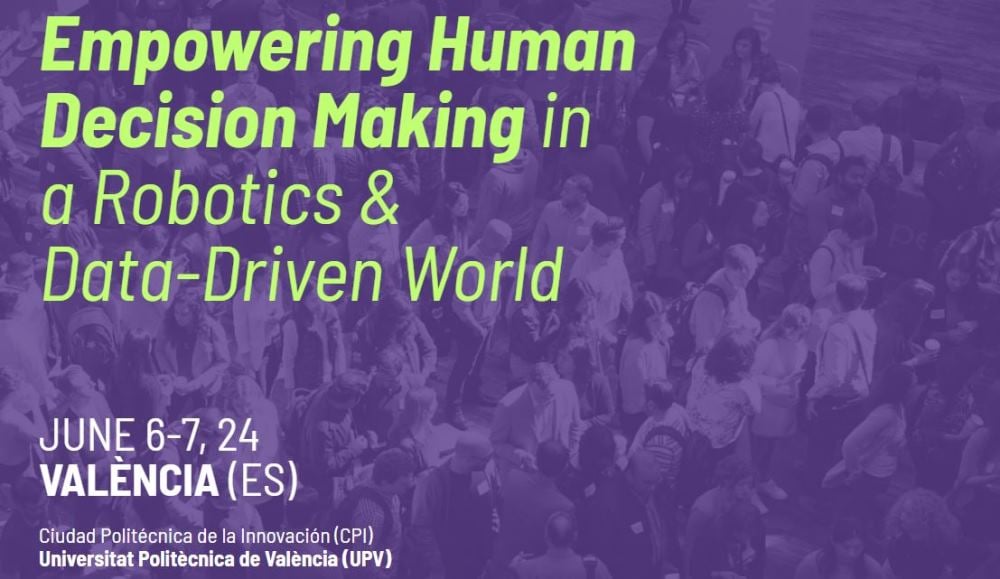Conferences
Upcoming MDPI Conferences (0)
No conferences found for the selection.Upcoming Partner Conferences (4)

Valencia, Spain
The International Summer Conference of Decision Science Alliance stands out as the premier gathering for decision-makers. Industry experts and academic professionals delve into the profound impact of technological advancements, including Mathematical Optimization, Operational Research/Management Science, AI and Machine Learning, Statistics, Robotics and Automation, Simulation and Emulation, Decision Process Analysis and Design.
The conference explores how these advancements influence human decision making across various sectors, ranging from Healthcare and Transportation to Manufacturing and Finance and many others.
For more details, please refer to:

Porto, Portugal
The International Conference on Mathematical Analysis and Applications in Science and Engineering (ICMA2SC’24) will take place in the beautiful city of Porto, Portugal, on 20–22 June 2024.
This conference is dedicated to the memory of Prof JA Tenreiro Machado, who passed away in October 2021.
Its aim is to bring together researchers from every discipline of applied mathematics, science, engineering, industry, and technology, to discuss the development of new mathematical models, theories, and applications that contribute to the advancement of scientific knowledge and practice.
We expect the authors to propose research including topics such as partial and ordinary differential equations, integer and fractional order equations, linear algebra, numerical analysis, operations research, discrete mathematics, optimization, control, probability, computational mathematics, amongst others.
The conference is designed to maximize the involvement of all participants and will present state-of-the-art research and the latest achievements.
The main topics include:
- Ordinary and Partial Differential Equations: Theory and Applications;
- Mathematical Modelling involving time fractional ODEs and PDEs;
- Integral Equations and Integral Transforms;
- Uncertainty Quantification in Mathematical Modelling;
- Control Theory, Optimization, and their Applications;
- Probability, Statistics, and Numerical Analysis;
- Inverse Problems: Modelling and Simulation;
- Computational Methods in Sciences and Engineering;
- Fractional Dynamic Systems and Applications;
- Fractional Signals and Systems;
- Singularities Analysis and Integral Representations for Fractional Differential Systems;
- Special Functions Related to Fractional Calculus;
- Applications in Biological Systems and Cancer Dynamics;
- Applications to Electrical Engineering, Electronics, Electromagnetism, Electrochemistry, Finance and Economics, Fractional Earth Science, Image Processing, Robotics, Automatic Control, Mechanics, Viscoelasticity, Thermal Engineering;
- History of Fractional Calculus;
- Mathematics Education.
Special Session #1
Impact of Fractional Calculus in Modelling and Control Applications
Special Session #2
Mathematical Modeling of Biological Systems
Special Session #3
Advances in Computational Techniques for Medical Diagnostics and Treatment
Special Session #4
Fractional Signal Processing
Special Session #5
Difference & Differential Equations with Applications
Special Session #6
Computational Mathematics, Computational Statistics and Applications
Special Session #7
Fractional Modelling and Artificial Intelligence in Biomedical/Diseases
Special Session #8
Mathematics Courses: Blackboard Teaching or 21st-Century Teaching?
Special Session #9
Modeling with Differential and Difference Equations with Uncertainties
For more information, please refer to:

Glasgow, UK
The 2nd International Conference on Mathematical Physics and Computational Simulation (CONF-MPCS 2024) is a leading conference on mathematics and physics. CONF-MPCS 2024 is open to international participants. It provides an excellent opportunity for scholars interested in mathematics, physics, and simulation to share their findings and achievements, thus promoting communication and cooperation. The goal of this conference is to bring together researchers and practitioners from academia and industry to highlight the importance of business analysis as well as establish new collaborations in these areas. The conference looks for significant contributions to mathematics, physics, and simulation in theoretical and practical aspects.
For more details, please refer to:
Viña del Mar, Chile
The 7th International Conference on Applied Informatics (ICAI 2024) will be held at the Universidad Andrés Bello located in Viña del Mar, Chile, from 24 to 26 October 2024. It is organized by the Universidad Andrés Bello and the ITI Research Group, which belongs to the Universidad Distrital Francisco Jose de Caldas.
ICAI aims to bring together researchers and practitioners working in different domains in the field of informatics in order to exchange their expertise and discuss the perspectives of development and collaboration. Submitted papers should be related to one or more of the main topics proposed for the conference:
- Artificial Intelligence
- Bioinformatics
- Data Analysis
- Decision Systems
- Business Analytics
- Cloud Computing
- Enterprise Information System Applications
- Game Development
- Gamification
- Geoinformatics
- Health Care Information Systems
- High-Performance Computing
- ICT-Enabled Social Innovation
- Interdisciplinary Information Studies
- Interaction Design and Usability
- IT Architectures
- Learning Management Systems
- Mobile Information Processing Systems
- Natural Language Processing
- Robotic Autonomy
- Social and Behavioral Applications
- Software and Systems Modeling
- Software Architectures
- Software Design Engineering
- Virtual and Augmented Reality




